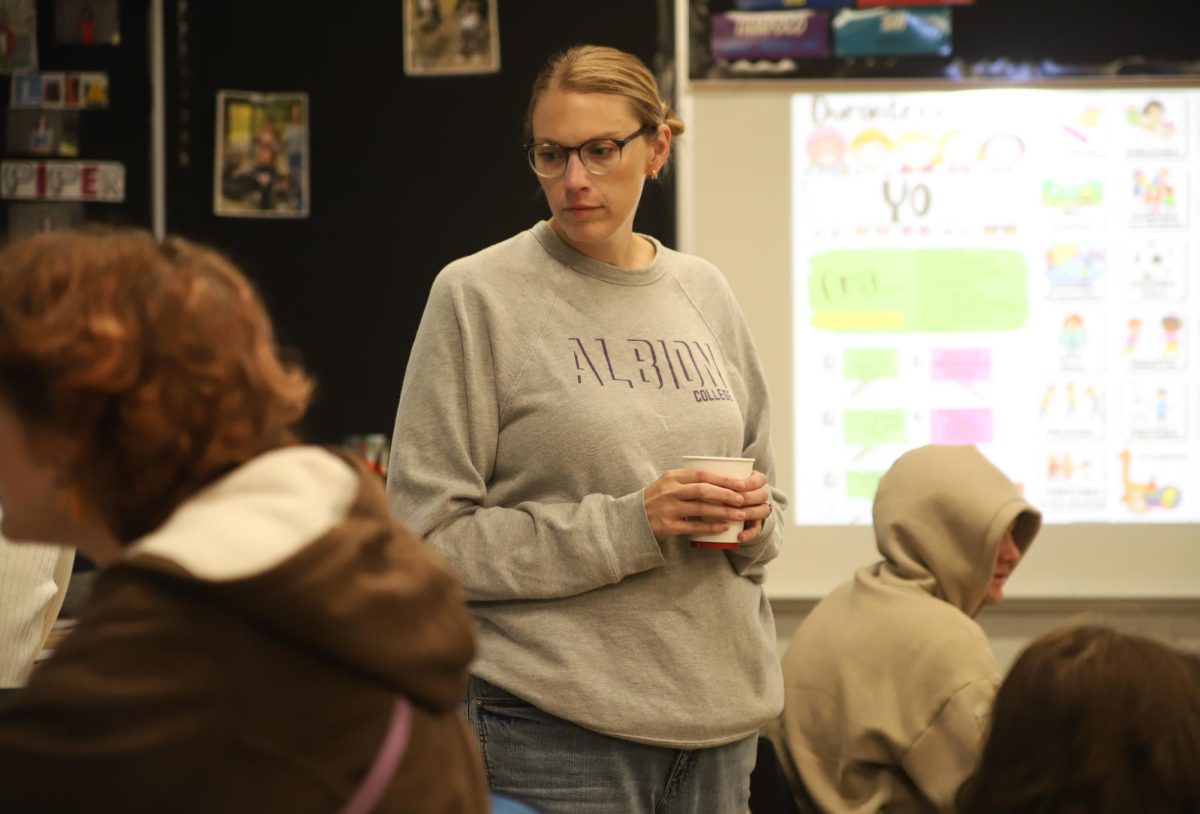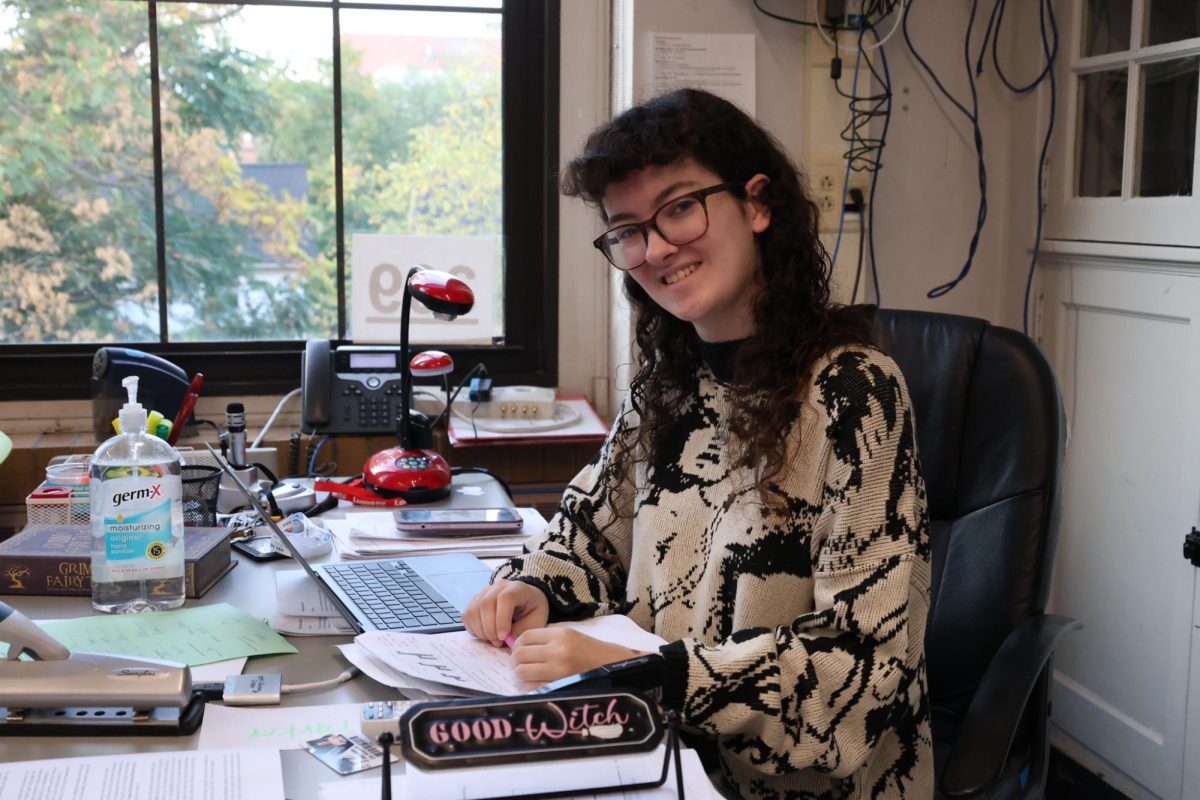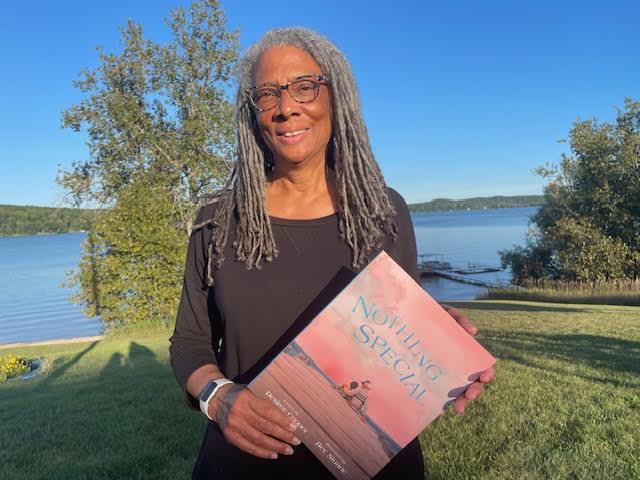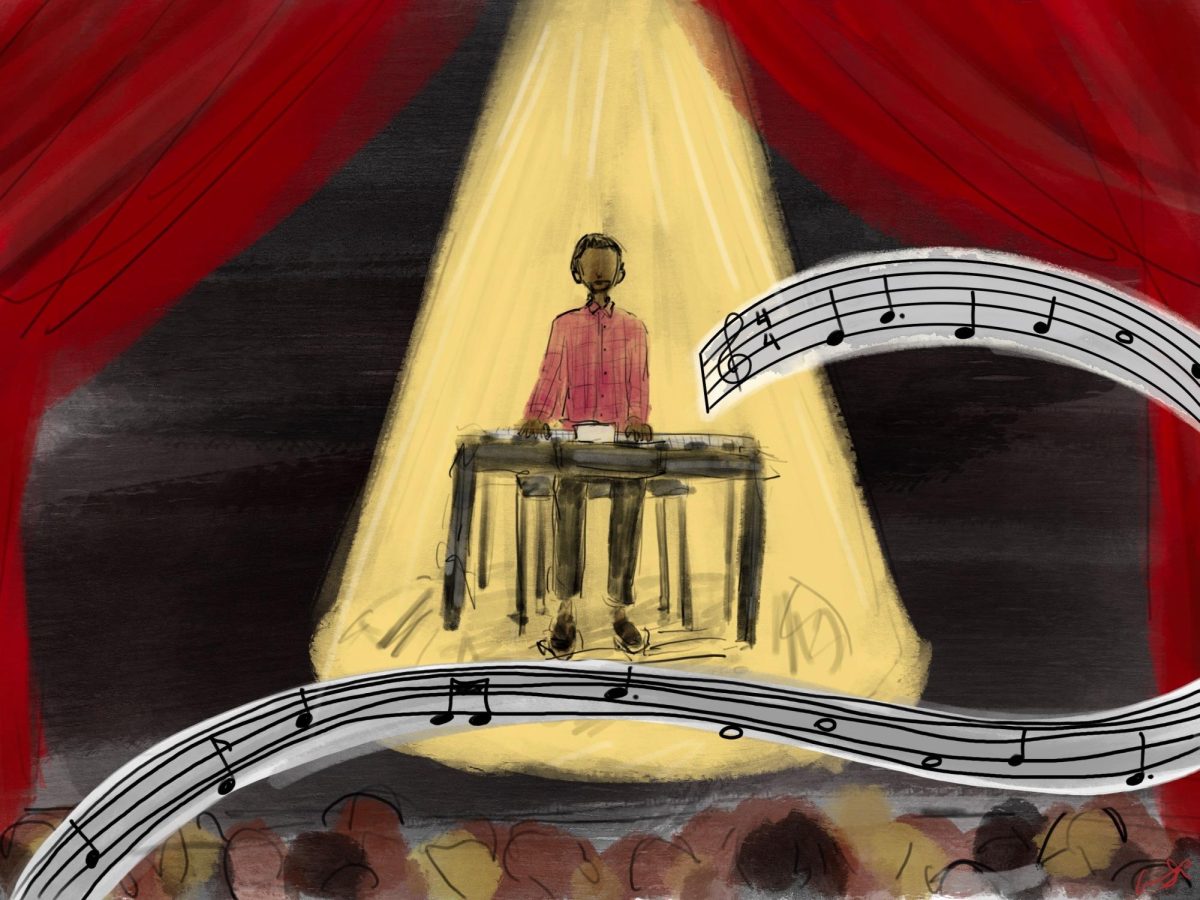Several years ago, Community High English teacher Judith DeWoskin was asked to teach another class and needed to choose a topic. She went down to the book room and looked through a mountain of titles that no one was using. DeWoskin noticed a common factor in the books: all of them had extremely depressing themes. She used this idea to design her course.
“I taught this funny course called Search for Self and it was just one depressing book after the next,” she said, laughing. “It was the most depressing thing I’ve ever taught…it was hideous.”
This kind of originally-designed course on a unique topic may seem strange in a high school setting, but such innovation is expected at CHS. If the school’s defining principles are its emphasis on independence and its unique programming, this is demonstrated nowhere more than in the English program, where teachers are encouraged to focus courses around subjects that interest them and students have the freedom to choose from a wide menu of courses.
Though the gloomy Search for Self class is no longer taught, a myriad of unique English courses remain at CHS. DeWoskin, who chairs the English department, explained that there are currently around 30 courses that the English faculty teaches on a rotating basis; approximately 15 different classes are taught per semester. Many are literature courses, while others focus on creative writing or journalism.
During their freshman year, students are required to take a semester of Intro to Literature, which introduces them to a wide variety of texts, including short stories, novels, and plays, and teaches analytical essay writing and literary terms. After that, students can shape their own English education based on which courses interest them. The only restriction is that students must have at least one semester of a literature class besides Intro to Literature, and they must take four years of English total.
“The main goal here, or the gift, is that teachers teach what they’re good at and what they’re really interested in, so long as every class has its major component of writing and each class reads a certain number of books,” explained DeWoskin.
“I think when teachers teach what they’re really interested in, they’re much more interesting people…it’s better for students, it’s better for teachers,” she added. “But also…if you shape a class around a common theme, or a certain genre, I think you get a much more intense look. It’s the specificity I think that makes for very interesting courses.”
Though the CHS English program structure is different than more sequence-based English programs in many other high schools, including the other three Ann Arbor high schools, it is still able to comply with the state requirements. According to CHS Dean Jen Hein, the teaching of English at CHS incorporates all of the content expectations from the Michigan Merit Curriculum.
“We have different titles, but the way the Michigan Merit Curriculum was planned was it’s not about the title of the class; what it’s really about is reading and writing and it’s a practice that they call recursive, which means that the same emphasis in every English class is there. So in every English class, it’s reading and writing, reading and writing,” Hein explained.
CHS junior Rose Henkin has found that the diversity of courses makes for an enjoyable high school English experience. “I like that you are able to tailor your English education to what you like to do because I think there are classes for mainly everyone,” she said. “Whichever English class I’m taking, I know I’m going to like it, I know I’m going to enjoy it.”
In addition to Intro to Literature, Henkin has taken Philosophy Literature, American Literature, and Creative Writing. She is now taking Short Story Writing and is an editor of the school’s literary magazine, Free Verse, which is staffed by students in the Creative Writing and Short Story Writing classes.
One of the possible risks of the program structure is that students are entirely responsible for putting together their English education, so they can miss out on important books and themes if they don’t take certain classes. But DeWoskin does not consider this as a big problem at CHS.
“I would like to think that everybody should have American Lit and World Lit, because I just feel like that’s your sort of core knowledge that everyone needs,” she said. “But one of the beliefs in this school is that we respect the differences of students in this school and we give you choices, and we respect your right to say, ‘I’m not ready for this right now’ or ‘Right now in my life I’m not interested in this’ or ‘I’m afraid of this.’”
DeWoskin thinks that there are multiple routes to form a good English education at Community. “It has to be okay for students to take Sci Fi [Lit], Fantasy Lit, Chinese Lit, Harlem Renaissance Lit, and never take World Lit and maybe take Pop Lit and in Pop Lit read some American Lit and some World Lit but never take American Lit,” she said. “I have to believe that. And part of it’s because I believe in my colleagues, and I believe that my colleagues are delivering rigorous, interesting classes. And so kids will just come out a little different. That’s okay.”
DeWoskin also noted that CHS students tend to be strong students that choose to take a lot of English credits and take more than the required amount of literature classes. She estimated that about 75 percent end up opting to take either American Literature, which she herself teaches, or World Literature, which is taught by Ken McGraw, or both classes.
Besides its unique structure, another defining feature of the CHS English program is its focus on writing and its effectiveness in preparing students for college.
Alumna Kayla Stoler, who is a sophomore at Wesleyan University in Connecticut, can attest to the impact of the department on her writing skills. Stoler took at least eight different English courses during her time at CHS, and credits the CHS English program with giving her confidence when approaching challenging college assignments.
Stoler is in the rigorous College of Social Studies at Wesleyan, in which weekly reading assignments can reach up to 1,500 pages, and every Friday Stoler must complete a five to seven page paper analyzing the material. She said that the reading and writing skills she learned from CHS helped give her the courage to enter the program.
“Most public high school students do not learn how to write a standard five-paragraph analytical essay. At Community, this framework is ingrained into every student by the time they cross the floor of Rackham [for graduation.] Learning to read and write analytically
is an invaluable skill for every single student,” said Stoler.
Both DeWoskin and Hein agree that the English program’s focus on analytical writing is the main reason it is so successful in college preparation.
“I’d like to think it’s all about writing. It’s all about reading and writing. There’s just nothing mysterious about it,” said DeWoskin. “It’s about reading books that students are interested in. Or if they think they’re not interested in them, just because they read them in class and because they discuss them in class, they become interested and they have some sense of them and they write and they write and they write.”
Students often come back and tell DeWoskin that they have excelled in their freshman English classes and impressed their professors with skills in analytical writing.
DeWoskin said that as long as she has been teaching, she has taught students to write analytical papers in strict, college-level format. Other teachers at Community do the same. DeWoskin, McGraw, Tracy Anderson, and Janelle Johnson all use similar criteria sheets for analytical papers. Students become more accustomed to the analytical paper format as they progress through literature classes.
Henkin feels that she has already benefited from the emphasis on analytical writing. “Just writing essays over, over and over again and just getting better grades on them each time has made me want to get better, so I keep it up,” she said.
Of course, CHS does not contain the only strong English classes in Ann Arbor. Senior Alon Samuel’s home school is Pioneer High School, but he takes classes at CHS, and he has taken English in both buildings: English 9, English 10 and a semester of British Literature at Pioneer, and a semester of World Literature at Community. He thinks that there are advantages to both programs.
“I think it just depends on the teacher,” he said. He said that his English 10 class at Pioneer sophomore year was the most writing intensive class he has had so far.
DeWoskin agrees that the teacher is the most important factor; her teaching style has not changed based on the building she teaches in. “When I taught for a couple months at Pioneer as a sub, I did exactly what I’m doing here. And I taught at Huron too for a semester and did pretty much what I’m doing now,” she said.
Samuel also noted that while students at Pioneer are required to complete English 9 and English 10 during the first two years of high school, they have a good amount of choices for English classes starting in junior year. “When it comes to junior year, there’s about as much choice [as there is at CHS], I’d say,” he said. However, Samuel does think that he would have liked to have more choices his freshman and sophomore years.
Because Community’s English curriculum does not have students taking courses like English 9 and English 10, it requires more explanation of the curriculum to colleges so that colleges can accurately evaluate students’ applications. CHS counselor Diane Grant said that the unique structure “hasn’t been an issue in the college admissions process.”
“Every college gets a profile [of CHS], so they know that we offer unique English classes and they’re on a rotating basis,” said Grant. “So they’re aware of that. We do a lot of explanation when they come to visit.”
The unique courses can actually be an advantage in college admissions. “I think they look upon it favorably too, because it’s more descriptive to have a title that describes what you’re learning, like Chinese Literature versus English 11,” said Grant.
Grant noted that all classes, except for Intro to Literature, are presented to colleges as mixed-grade classes; none are considered to be higher level than others.
This mixed-grade nature of CHS English classes is a natural consequence of students’ freedom to choose classes. Though DeWoskin thinks this requires teachers to be alert and aware of the grade level of the writing they are reading, she also thinks it is a great advantage to the school that younger students can learn from older students in a classroom setting, and that there can be, in discussions, “a huge variety of responses that are based on experience.”
“I think it gives people in this building a sense of community that extends beyond their own grade level…it helps develop a sense of respect for all the different grades,” she said.
Henkin is also glad that the classes are mixed-grade, and thinks that this has the most benefit in Creative Writing, where students often share their work. “I think the main benefit for me with the mixed grade classes is getting advice and influence from older writers, and being able to help out younger writers,” she said. “I think underclassmen can also learn to feel more confident with their writing if they are encouraged by upperclassmen to read aloud. Getting praise from a more experienced writer is very encouraging.”
Luckily, the English program has not had to sacrifice its many successes due to state-wide budget cuts. So far, no English courses have had to be cut, according to Hein.
“It hasn’t really hit the English department in any major way yet,” said DeWoskin. “You know, once in a while [Dean] Jen will have to say no to ordering a textbook, but there are ways around that. Katy, our secretary, can borrow books from other buildings. When we want to get new books, we have to go to [Dean] Jen. She’s pretty generous and she knows how important it is for us to be teaching books that we love. But budget cuts could really hurt that.”
However, disregarding future budget cuts, CHS’s English program seems poised to preserve its structure for years to come. Hein explained that requirements will not be an obstacle: “The high school content expectations are now actually reflected in the common core state standards, which are actually national standards for English/Language Arts, and the focus of the common core standards are reading and writing. So we’re going to be able to continue to offer the variety of exciting classes that we have, but still keep a very high standard for requirements.”
DeWoskin explained that the changes in the program depend on the flow of teachers in and out of the school as teachers come in and establish classes related to their interests. However, she thinks that the broader courses of American Lit and World Lit will always remain constants in the program, even as the staff changes.
Overall, the CHS English program is a magnet for praise from parents and students alike. “It is extremely well respected by students. It is very well respected by the district. It is very well respected by parents and by local universities,” said Hein. DeWoskin said that she has never received negative feedback about the structure of the program.
But for DeWoskin, the most rewarding aspect of all is getting to spend time with students. “It’s being involved with the budding, growing minds of kids from 14 to 17 every day five days a week,” she said. “In conversation, in dialogue with your papers, and seeing you go from that 14 to 17, seeing you go from these little puppies in ninth grade and graduate as these stunning young people.”








